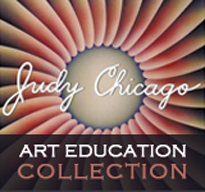Join the Dialogue Go to Dialogue
“What About Men?” Part III of the Judy Chicago Dialogue Portal, addresses the often contentious subject of men in a feminist environment and takes up some of the challenges of making institutional changes in terms of curriculum. Part III features and is inspired by the 2014 symposium talks by photographer Donald Woodman and Andrew Perchuk, deputy director of the Getty Research Institute.
What About Men by Donald Woodman, photographer and collaborator with Judy Chicago on the Holocaust Project (1985-1993) exhibition and teaching (2001-2005), at the Judy Chicago: Planting a Feminist Art Education Archive Symposium at The Pennsylvania State University on April 6, 2014.
Because of the social pressure and the rewards promised for supporting a patriarchal system, it is difficult for both men and women to stand up to and change these values and practices. Collaborating with Judy Chicago in recent teaching projects, Woodman has provided a role model for other men of how to act in a supportive/cooperative/inclusive manner in an effort to both challenge and change the dominant patriarchal model of studio art education.
You Say You Want a Revolution: Feminist Art in Southern California by Andrew Perchuk, deputy director of the Getty Research Institute, at the Judy Chicago: Planting a Feminist Art Education Archive Symposium at The Pennsylvania State University on April 6, 2014.
This talk looks at the origins of feminist art in Southern California. It examines the conditions that women artists labored under before feminism and the steps these artists took to intervene and materially change their situation. Artists such as Judy Chicago, Miriam Schapiro, Faith Wilding, and Suzanne Lacy created new models of artistic education, launched groundbreaking projects like Womanhouse, and founded their own institutions such as the Woman’s Building. The lecture presents new research on how feminist artists recast some of the terms of Los Angeles art, transforming supposedly universal and apolitical concepts such as craft, perception, and place into gendered and politically-engaged terms that had a revolutionary impact on 1970s art.
Part III Dialogue Questions:
- Men and feminist art: Do you think men can make feminist art? If so, please provide some examples. If not, why not?
- Education about men in feminist activism: While many men have supported women’s struggle for equality, there is a lack of education about men active in feminist activism. Why do you think this is?
- Men’s role in the struggle for women’s equality? Do you think that men have a role in the struggle for women’s equality; if so, what?
- Changes in studio art courses and programs? Some women students in studio art classes perceive that faculty pay more attention to male students, or that the male students are more vocal during studio group critiques. Is this your perception? If so, how do you think studio art courses and programs can be changed so that there is equity in opportunities to learn?
- Male/female binaries? Do institutions of education address the needs of those who reject the binaries of male/female? If not, why not?
- Institutional changes for a diversity of gender identities?
Resources:
VIDEOS:
- PowerPlay (2012, Judy Chicago in conversation with Dr. Jonathan D. Katz about “ReViewing PowerPlay”, July 7, 2012, moderated by Merry Scully at the New Mexico Museum, 57:59 min)
- Michael Kimmel: On Gender (2008, 55 min.)
- Tough Guise 2: Violence, Manhood & American Culture (2013, 81 min.) Katz, J., & Earp, J. Study guide for Tough Guise.
JOURNALS:
- Culture, Society and Masculinities
- Journal of African American Males in Education
- Journal of Black Masculinity
- Norma: International Journal for Masculinity Studies
- The Journal of Men’s Studies
BOOKS:
Adams, R., & Savran, D. (Eds). (2002). The Masculinity Studies Reader. Malden, MA: Blackwell Publishers.
Gardiner, J. K. (Ed.). (2002). Masculinity Studies and Feminist Theory: New Directions. New York, NY: Columbia University Press.
Kimmel, M. S., Hearn, J., & Connell, R. W. (Eds.). (2005). Handbook of Studies on Men and Masculinities. Thousand Oaks, CA: Sage Publications.
Kimmel, M. S., & Mosmiller, T. E. (Eds.). (1992). Against the Tide: Pro-Feminist Men in the United States, 1776-1990 a Documentary History. Boston, MA: Beacon Press.
Tarrant, S. (Ed.). (2013). Men Speak Out: Views on Gender, Sex and Power (second edition). New York, NY: Routledge.
- This forum has 6 topics, 105 replies, and was last updated 6 years, 11 months ago by .
-
- Topic
- Voices
- Last Post
- You must be logged in to create new topics.
